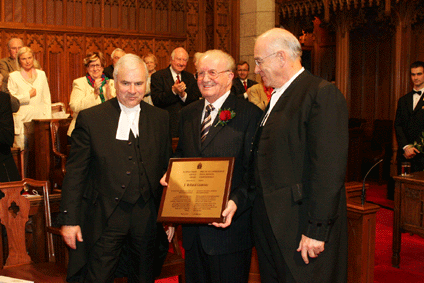On May 30, 2005, former Liberal MP Joseph-Roland Comtois was awarded the 7th annual Distinguished Service Award. Mr. Comtois’s award gives recognition to more than 20 years in Canadian politics. He represented the ridings of Joliette-L’Assomption-Montcalm and Terrebonne, Quebec, from 1965 to 1984, except for a few months in 1976-77. “His life as a public servant enriched the country,” said the Honourable Peter Milliken, Speaker of the House of Commons. “He was elected to office so many times I won’t bother to count.” The Right Honourable Herb Gray, who attended the ceremony, called Mr. Comtois an example of public service. “In addition to front-benchers who make more of the headlines, there’s a very solid group of people with real substance like Roland Comtois who deserve the kind of recognition he got today.”

In his acceptance speech, Mr. Comtois detailed many stories of his early years and his civilian, military and political life. He described his modest origins, as the youngest in the family of 15 children, his school years that ended at the age of 16 when he went to work in a war-time factory, his return to his education and his marriage to Huguette Desrosiers, 10 days before he entered the École Polytechnique of the Université de Montréal to study engineering.
While still a student, he enrolled in the Canadian Army Reserve to take the Infantry Officer course and graduated as a Lieutenant. In the summer of 1951, he was assigned to the 1st Battalion, Royal 22e Régiment to finish off training with the parachute battalion that was to leave for the Korean War that December. He described his involvement in his community, his career as a visionary builder, his volunteer work, his role as churchwarden of his parish, as director of the credit union, and as founder and President of the Hôpital LeGardeur, as well as a day-care centre.
He discussed difficulties in his political career caused by his opposition to the hierarchy in his party. In the 1965 election, he won a seat in Parliament on his third attempt, by a majority of 219 votes, the last MP elected in Canada on election night, with the majority having changed sides seven times. He even succeeded himself in a by-election that came about when he resigned to run at the provincial level against Jacques Parizeau, the Parti Québécois’s star candidate, when he was defeated.
As a parliamentarian, he is proud of his many achievements, including improvements to services for backbench MPs, the bill on electoral spending, higher salaries and pensions for members of Parliament, and the lowering of the age of eligibility for old-age security from 65 to 60 years.
Mr. Comtois’ parliamentary roles included Parliamentary Secretary to the ministers of Communications, National Defence and Finance, when changes were made to the regional telephone system and a number of long-distance divisions were eliminated between many of the towns in the Montreal area and then in other major urban centers in Canada; the modernization of the Collège Militaire Royal in St-Jean; equal status for women in the Armed Forces cadets; and the elimination of customs tariffs on amusement parks and sideshows that are part of all types of fairs and major commercial and agricultural exhibitions in Canada.
Mr. Comtois was the Vice-Chair and Chair of the Standing Committee on Finance, Trade and Economic Affairs, and Vice-Chair of the Standing Committee on Management and Members’ Services, Chair of the Canada France Interparliamentary Association, and Vice-Chair of the Canadian NATO Parliamentary Association. He was also decorated with the Order of La Pléiade by the International Association of French-Speaking Parliamentarians.
He had the honour of representing Canada and leading several delegations to many countries as well as to the United Nations, the International Monetary Fund, and the Committee on Security and Cooperation in Europe.
In his home riding, he worked toward the establishment of the Mirabel Airport, the Motor Vehicle Test Centre (the only one in Canada), the Archambault Institution (a maximum-security penitentiary), the Ile-des-Moulins historic site in Terrebonne (the second largest historic site in Quebec), highway 640, and the creation of two separate administrative regions for Laurentides and Lanaudière (he also co-chaired the economic summit that preceded the new status).
He likes to remind his colleagues of the following: in the general elections in 1962, 1963 and 1965, the person who spoke most often on his behalf was Bernard Landry, then a committed Liberal, who later became Leader of the Parti Québécois and Premier of Quebec; his meeting with French President General Charles de Gaulle, one hour before the famous “Vive le Québec libre” speech; his meeting with Pope Jean Paul II, one week before the attempt on his life; and his friendship with German Chancellor Helmut Schmidt, who opened all the Olympic sites in Munich to him and invited him to attend the opening ceremonies of the 1972 Olympic Games.
As a former parliamentarian, Roland Comtois sat on the CAFP Board of Directors for more than 15 years, and held the position of Vice-Chair, Chair, Past-Chair and again Vice-Chair before stepping down. In 1994, he initiated the association’s recognition process that was ultimately brought into effect by his colleague Barry Turner.
Roland Comtois ended his speech with these words: I was born Canadian; my father often told me that we were “Canadian”. I dream of the day when the citizens of our country will define themselves as Canadians from Quebec, Ontario, Alberta, Newfoundland or any other province or territory, without distinction by origin, race, colour, religion or language.
Let us all be Canadian; let us all be proud of our country.